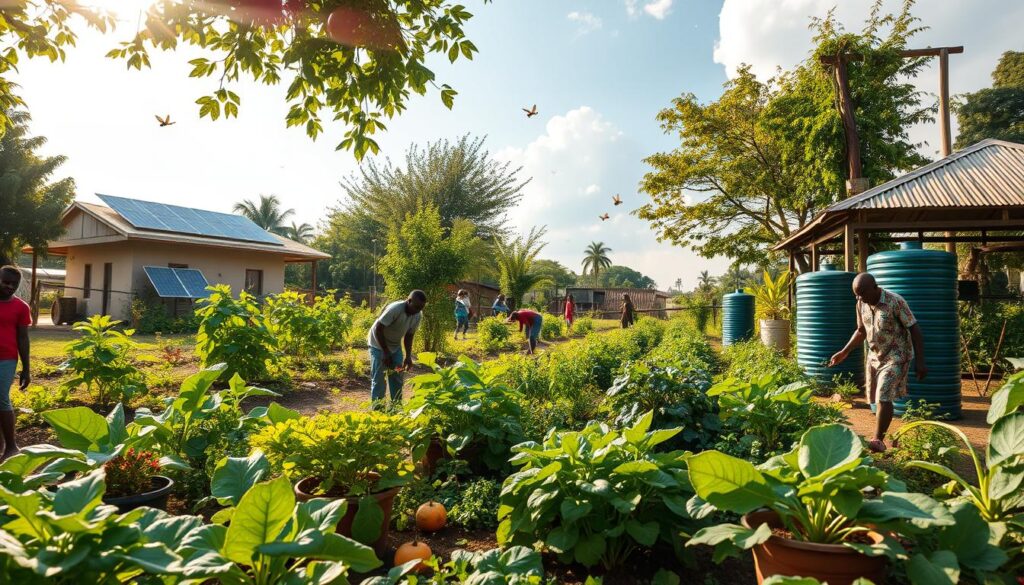
In Nigeria, the cost of living can be high. Adopting a frugal lifestyle helps stretch your money further. This guide offers practical tips to save money and live sustainably. You’ll learn about budgeting, tracking expenses, and saving on utilities and transport.
Key Takeaways
- Develop a realistic budget and track your expenses to gain control over your finances
- Implement energy-saving measures to lower your utility bills
- Explore cost-effective housing options and maintain your home to save on expenses
- Adopt smart shopping strategies and meal planning to reduce your grocery bills
- Discover free and low-cost entertainment alternatives to cut back on leisure expenses
Budgeting and Expense Tracking
Creating a budget and tracking your expenses are key to living frugally in Nigeria. A budget that fits your financial goals helps you manage your spending. This way, you can save money wisely.
Creating a Realistic Budget
Start by listing your income and expenses. Include your salary, freelance work, and other income sources. Then, sort your expenses into needs (like rent and food) and wants (like entertainment).
This helps you see where you can save. Be honest about how much you spend. Set aside money for unexpected costs. Check your budget often and adjust it to stay on track.
Monitoring Expenses with Apps and Tools
Today, many apps and tools can help you manage your money. In Nigeria, PiggyVest, Cowrywise, and Wema Bank’s ALAT are popular. They track your spending, categorize it, and send budget reminders.
These apps help you understand your spending. They also offer tips to reach your financial goals. This makes saving easier.
Effective budgeting and tracking are crucial for a frugal lifestyle in Nigeria. With a smart budget and digital tools, you can control your finances. This leads to better money management and savings.
Reducing Utility Costs
Living in Nigeria, managing your utility costs is key to saving money. There are many ways to cut down on electricity and water use. This leads to big utility cost savings and a greener lifestyle.
Energy-Saving Tips for Electricity
To lower your electricity bills, try energy-efficient habits. Switch to LED bulbs, which use much less energy than old bulbs. Also, make sure your home is well-insulated to avoid overusing AC or heaters.
Turn off electronics and appliances when not in use. They still use power even when turned off but not in use.
- Get energy-saving appliances like fridges, washers, and ACs to use less electricity.
- Keep your thermostat at a comfy level and use fans to cut down on AC use.
- Use natural light by opening curtains and blinds during the day to save on lights.
Water Conservation Strategies
Water is vital, and saving it can cut costs and help the planet. Fix any leaks to avoid wasting water and money. Use low-flow showerheads and faucets to save water without changing your daily life.
- Use rainwater for watering plants and cleaning to cut down on tap water use.
- Water your lawn and garden when it’s cooler to reduce evaporation.
- Teach your family to save water, like turning off the tap while brushing teeth and taking shorter showers.
By using these energy-saving and water conservation tips, you can lower your bills. This helps make living in Nigeria more sustainable.
Frugal Living Tips for Housing
Housing is a big expense in Nigeria. Whether you rent or buy, there are ways to save money. You can also keep your living space affordable.
Rent or Buy? Weighing Your Options
Choosing between renting and buying depends on your finances and goals. Renting is flexible with lower costs and no maintenance worries. Buying offers stability and equity growth. Think about what’s best for your affordable housing needs.
Maintaining and Repairing Your Home
Proper maintenance and DIY home repairs save money. Learn to fix simple issues like leaky faucets and unclog drains. This avoids expensive professional help.
Regularly check your home for problems. Fix them quickly to avoid costly repairs later.
By choosing wisely and maintaining your home, you can cut housing costs. This way, you can live more frugally in Nigeria.
“The key to frugal living is to prioritize your needs, be proactive with home maintenance, and explore creative solutions to save on housing costs.”
Transportation Savings
Commuting in Nigeria can be expensive. But, there are ways to cut down on transportation costs. Using public transit, carpooling, and keeping your vehicle in good shape can save you a lot each month.
Public transit is a cheap way to get around. Cities in Nigeria have buses and trains that are easy on your wallet. They save you money on fuel, insurance, and car upkeep. Plus, some places offer discounts or subsidies for locals.
Carpooling is another smart move. Sharing rides with others means you split the costs of fuel, parking, and car care. It’s good for your wallet and the environment, too.
Keeping your car in top shape is key to saving money. Regular oil changes, tire rotations, and tune-ups boost fuel efficiency and extend your car’s life. This prevents expensive repairs later on.
| Transportation Cost Savings Strategies | Potential Monthly Savings (in Nigerian Naira) |
|---|---|
| Utilizing public transit | ₦5,000 – ₦15,000 |
| Carpooling with colleagues | ₦3,000 – ₦10,000 |
| Maintaining your vehicle efficiently | ₦2,000 – ₦8,000 |
By using these transportation savings tips, you can lower your monthly bills. This lets you save for other important things. With a bit of planning, you can enjoy cheaper and greener travel in Nigeria.
Food and Grocery Hacks
Managing your household expenses can be tough, especially with food and grocery costs. But, with smart meal planning and shopping, you can cook tasty meals without breaking the bank. Here are some tips to save on groceries in Nigeria.
Meal Planning and Cooking at Home
Planning your meals and cooking at home can really cut down on spending. By making a meal plan, you only buy what you need. This reduces waste and saves money. Plus, home-cooked meals are healthier and cheaper than eating out.
Smart Shopping Strategies for Groceries
Here are some smart ways to shop for groceries:
- Make a detailed shopping list and stick to it to avoid unnecessary purchases.
- Take advantage of sales, discounts, and bulk-buying opportunities to stock up on non-perishable items.
- Opt for generic or store-brand products, which are often just as good as their name-brand counterparts but at a lower cost.
- Be mindful of the seasonality of fresh produce, as in-season items tend to be more affordable.
- Explore local markets and farmer’s markets for fresh, locally-sourced ingredients at competitive prices.
| Grocery Item | Average Cost (Nigerian Naira) |
|---|---|
| Chicken (1 kg) | 2,500 – 3,000 |
| Tomatoes (1 kg) | 400 – 600 |
| Rice (1 kg) | 500 – 800 |
| Eggs (1 dozen) | 800 – 1,000 |
| Bread (1 loaf) | 300 – 400 |
By using these food budgeting, meal planning, and home cooking tips, you can enjoy great meals. You’ll also keep your grocery shopping costs down, even in Nigeria.
Cutting Entertainment Costs
In Nigeria, finding fun without spending a lot can be easy. There are many free and cheap things to do. By living frugally, you can have a fun social life without spending too much.
Free and Low-Cost Activities
Look around your community for free fun. Visit public parks, libraries, and museums for free events and exhibits. Also, check out free local festivals, concerts, or cultural events to enjoy Nigerian arts and traditions.
For active fun, try low-cost hobbies. Play soccer or basketball with little gear. Or, join a fitness class or jog in your area for free fun and fitness.
Get creative with cheap hobbies like painting, writing, or playing a musical instrument. Use social media to find people with similar interests. Join online groups or workshops for your hobbies.
Choosing free and cheap fun can make your leisure time rich and affordable. Focus on experiences over things. You’ll find a world of free activities and low-cost hobbies that make your leisure spending in Nigeria worthwhile.
Frugal Living Tips for Clothing and Fashion
Looking good doesn’t have to cost a lot. Smart strategies can help you stay stylish without spending too much. Second-hand shopping and thrifting are great for clothing budgeting in Nigeria. They let you find unique, quality items and support sustainable fashion.
Shopping Second-Hand and Thrifting
Second-hand stores and thrift shops are full of great finds for those watching their budget. Shopping second-hand means you can get designer labels and vintage pieces for less. Thrifting also helps reduce waste and supports a circular economy.
- Scour local thrift stores and secondhand shops for hidden gems
- Check online platforms like Depop, Vinted, and Facebook Marketplace for second-hand shopping opportunities
- Hone your thrifting skills by learning how to spot quality, well-made garments
- Embrace the joy of the hunt and the thrill of finding unique, affordable fashion
Adding thrifting and second-hand shopping to your wardrobe saves money and helps the environment. It also lets you express your personal style in a unique way.
“Fashion is not something that exists in dresses only. Fashion is in the sky, in the street, fashion has to do with ideas, the way we live, what is happening.” – Coco Chanel
Discover the power of sustainable fashion and find stylish, affordable options in Nigeria.
Managing Debt Responsibly
Debt can block your path to financial stability and a frugal lifestyle in Nigeria. But, with smart strategies, you can manage your debt and aim for a debt-free life. This section will guide you on how to consolidate and repay your debt, helping you take back control of your finances.
Debt Consolidation and Repayment Strategies
Debt consolidation is a great way to handle debt. It means combining several debts into one, lower-interest loan. This makes payments easier and can cut down on interest costs over time. Also, having a solid debt repayment plan is key to tackling your debt step by step.
- Look into debt consolidation options like personal loans or balance transfer credit cards to simplify payments.
- Make a detailed budget that focuses on debt repayment, putting a big chunk of your income towards high-interest debts first.
- Use debt management apps and tools to stay on top of your payments, track your progress, and make timely payments.
- Stay disciplined with your finances by cutting back on unnecessary spending and using those savings for debt repayment.
By using these debt management strategies, you can take charge of your finances and aim for a debt-free future. Remember, it takes patience and persistence to achieve financial freedom in Nigeria.
“The first step towards getting somewhere is to decide that you are not going to stay where you are.” – J.P. Morgan
Building an Emergency Fund
Unexpected expenses can quickly derail even the most carefully crafted budget. Having an emergency savings fund is crucial for maintaining financial resilience and weathering unexpected financial storms. In Nigeria, a strong rainy day fund can provide a much-needed safety net to cover sudden unexpected expenses without compromising your overall financial stability.
Building an emergency fund may seem daunting, but it’s an essential step towards long-term financial resilience. Start by setting a realistic savings goal, such as covering three to six months’ worth of essential expenses. Then, commit to contributing a fixed amount each month, even if it’s a small amount, to gradually grow your emergency savings.
- Automate your savings by setting up a standing order or direct debit to transfer a portion of your income directly into a dedicated emergency fund account.
- Look for ways to cut back on discretionary spending, such as dining out or entertainment, and redirect those funds towards your rainy day fund.
- Consider taking on a side gig or freelance work to boost your income and accelerate the growth of your emergency savings.
Remember, building an emergency fund is a journey, not a destination. Celebrate small milestones and stay motivated to ensure your financial resilience in Nigeria, where unexpected expenses can arise at any moment.
“A well-funded emergency savings account is the foundation of financial security and peace of mind.”

Saving for Retirement and Financial Goals
Securing your financial future is key to frugal living. Planning for retirement and saving for the long term are crucial. They ensure a comfortable and stress-free retirement. Investing wisely helps you reach your financial goals and build wealth over time.
Investment Options and Strategies
There are many investment options and strategies for retirement planning and long-term savings. These include:
- Retirement accounts, such as 401(k)s and IRAs, which offer tax-advantaged growth and provide a reliable source of income during retirement.
- Diversified investment portfolios, which may include stocks, bonds, and real estate, to spread risk and maximize returns.
- Passive investment strategies, such as index funds, which can provide consistent long-term growth with lower fees.
- Active investment management, where you or a financial advisor actively manage your investments to potentially achieve higher returns.
In Nigeria, it’s important to research and understand the various investment options. You should also know the potential risks and rewards of each strategy. Consulting with a financial advisor can help you create a personalized retirement plan. This plan should align with your financial goals and risk tolerance.
| Investment Option | Potential Benefits | Potential Risks |
|---|---|---|
| Retirement Accounts (401(k), IRA) | Tax-advantaged growth, employer contributions (401(k)) | Early withdrawal penalties, investment risk |
| Diversified Investment Portfolio | Spread risk, potential for higher long-term returns | Market volatility, requires active management |
| Index Funds | Consistent long-term growth, low fees | Limited upside potential, exposure to market downturns |
| Active Investment Management | Potential for higher returns | Higher fees, market timing risk |
“Compound interest is the eighth wonder of the world. He who understands it, earns it … he who doesn’t … pays it.” – Albert Einstein
By using different investment strategies in your retirement planning, you can increase your chances of achieving your financial goals. This ensures a comfortable future in Nigeria.
Frugal Living Tips for Healthcare
In Nigeria, healthcare costs can be a big problem for people and families. But, you can manage these costs and stay healthy without spending too much. Here are some tips to help you with healthcare costs in Nigeria.
Preventive Care is Key
Preventive care is a great way to cut down on healthcare costs. Regular check-ups and screenings can catch health problems early. This can save you money on more expensive treatments later. Many health plans in Nigeria offer free or low-cost preventive services. So, make sure to use these to stay healthy.
Explore Medication Savings
Prescription drugs can be very expensive. But, there are ways to save money on them. Try generic drugs instead of brand-name ones, as they are often cheaper. You can also look for medication assistance programs or ask your doctor for discounts on certain prescriptions.
| Medication | Brand-name Cost | Generic Cost | Savings |
|---|---|---|---|
| Amoxicillin | ₦5,000 | ₦2,500 | 50% |
| Metformin | ₦8,000 | ₦4,000 | 50% |
| Atorvastatin | ₦10,000 | ₦5,000 | 50% |
Switching to generic medications can save you a lot of money. This helps you manage your healthcare costs better.
Take Advantage of Health Insurance
Getting a good health insurance plan can really help with healthcare costs in Nigeria. Look for policies that cover a lot of services, like preventive care and prescription drugs. The cost of the premium might seem high at first. But, the benefits of having health insurance can be worth it in the long run.
By using these frugal living tips for healthcare, you can control your medical expenses. This way, you can stay healthy without spending too much. Being proactive and mindful about your healthcare can help keep your costs down and your health up.
Eco-Friendly and Sustainable Living
Nigerians are now embracing frugal living and eco-friendly habits. This not only saves money but also helps the environment. By reducing waste and reusing resources, you can positively impact your community and the planet.
Reducing Waste and Reusing Resources
Minimizing waste is key to sustainable living. Start by reducing your use of single-use plastics and choose reusable items like water bottles and shopping bags. Recycle as much as possible and consider composting organic waste to cut down on landfill trash.
Also, look for ways to reuse and repurpose items instead of throwing them away. You can upcycle old clothes into new accessories or repurpose household items for storage or decor. This gives your belongings a new life and reduces waste.
| Sustainable Living Practices | Benefits |
|---|---|
| Reducing single-use plastics | Minimizes waste and conserves natural resources |
| Recycling and composting | Diverts waste from landfills and reduces environmental impact |
| Reusing and repurposing items | Extends the lifespan of products and reduces the need for new resources |
By adopting these eco-friendly habits, you help create a more sustainable future while saving money. Remember, every small step towards sustainable living makes a big difference for the environment and your finances.

Frugal Mindset and Lifestyle Changes
Adopting a frugal mindset is key to financial success. It’s not about cutting back but finding ways to live better with less. By being financially disciplined, you can change your life and reach your money goals, even in Nigeria.
Understanding the difference between needs and wants is crucial. Knowing what you really need helps you spend wisely. This way, you can take care of your money without giving up on enjoying life.
- Identify and eliminate unnecessary expenses
- Prioritize needs over wants
- Embrace a minimalist approach to possessions
- Seek out free or low-cost alternatives for entertainment and leisure
Having a frugal mindset and money-saving habits are essential. This includes budgeting, planning meals, and doing DIY home repairs. By tracking your spending and finding ways to save, you can save a lot of money for your goals.
| Money-Saving Habit | Potential Savings |
|---|---|
| Meal planning and cooking at home | Up to ₦50,000 per month |
| Performing basic home repairs yourself | Up to ₦20,000 per year |
| Reducing energy and water consumption | Up to ₦10,000 per month |
Living frugally is a journey, not a final goal. Always check your spending, look for ways to save, and make choices that fit your financial goals. This way, you can achieve financial security and happiness.
“The secret of getting ahead is getting started.” – Mark Twain
Conclusion
In this guide, we’ve shared many frugal living tips to help you save money in Nigeria. These tips can help you manage your finances better. You can cut down on expenses and reach your financial goals.
We’ve covered budgeting, tracking expenses, and saving on utilities and transportation. We’ve also talked about smart ways to spend on food, entertainment, and healthcare. This guide aims to improve your financial health and help you live more sustainably.
Living frugally is more than just saving money. It’s about living in a way that reflects your values and helps the environment. As you follow these tips, you’ll not only save money but also make a positive difference in your life and the world.





